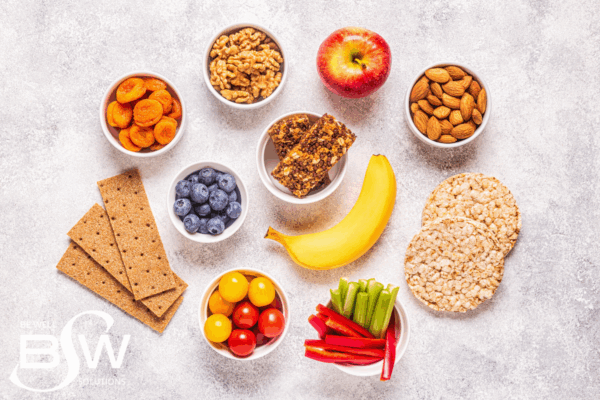When you think about snacks, what comes to mind? Chips, cookies, maybe a quick drive-thru run? While these choices might satisfy short-term cravings, they can leave you feeling sluggish, unfocused, and less prepared for your next workout or busy day. Snacking isn’t the enemy; it’s a valuable opportunity to fuel your body with the right nutrients. Whether you’re hitting the gym, heading into a meeting, or chasing kids around, the right snacks can help maintain steady energy, stabilize blood sugar, and keep hunger in check. Here’s how to snack smarter.
Think “Mini Meal” Instead of “Treat”
Snacks should have a purpose, just like your meals. According to USDA MyPlate, a balanced snack includes protein, healthy fats, and complex carbohydrates. This trio supports energy, promotes satiety, and helps prevent sugar spikes and crashes that can lead to overeating later in the day.
- Tips to make it happen:
- Include at least 5-10g of protein in your snack to keep muscles fueled and support recovery.
- Choose high-fiber carbs such as whole grains, fruits, or vegetables to keep you full longer.
- Add healthy fats (nuts, seeds, avocado) for slow, sustained energy.
- Smart pairings:
- Apple slices + almond butter
- Whole grain crackers + low-fat cheese
- Greek yogurt + berries
Choose Whole Foods First
Processed snacks tend to be high in added sugars, sodium, and unhealthy fats while being low in vitamins, minerals, and fiber. The Harvard Healthy Eating Plate emphasizes whole foods like fresh fruit, vegetables, nuts, and seeds provide more nutrients per bite and help you feel satisfied without the crash.
Why whole foods work better:
- Fewer additives – No hidden sugars, sodium, or artificial ingredients.
- More nutrients – Packed with vitamins, minerals, and antioxidants to support your immune system and overall health.
- Better satiety – The fiber in whole foods helps you feel full and supports healthy digestion.
Quick whole-food swaps:
- Replace flavored yogurt cups with plain Greek yogurt + fresh fruit.
- Swap potato chips for air-popped popcorn.
- Keep pre-cut veggies in the fridge for grab-and-go snacking.
- Grab a handful of unsalted nuts for on-the-go protein.
- Stock up on seasonal fruit for variety and freshness.
Watch Portion Sizes
Even healthy snacks can contribute to weight gain if portions get out of control, especially with calorie-dense foods like nuts or dried fruit. Being mindful of serving sizes helps you enjoy your snack without unintentionally overdoing it.
Practical portion tips:
- Use small containers or snack-size bags to pre-portion foods.
- Avoid eating straight from the box or bag, as this can lead to mindless munching.
- Learn visual cues:
- 1 serving of nuts = about a small handful (1/4 cup)
- 1 serving of hummus = about 2 tablespoons
- 1 serving of fruit = about the size of a tennis ball
Time for your Snacks
When you eat snacks matters just as much as what you eat, especially if you’re active. The Academy of Nutrition and Dietetics recommends timing for improved energy levels, enhanced performance, and help with recovery.
Before a workout:
- Choose easy to digest carbs + a little protein.
- Eat 30-60 minutes before activity to avoid discomfort.
- Examples: A banana, a rice cake with peanut butter, or a small whole grain wrap with turkey.
After a workout:
- Focus on protein + carbs to replenish energy stores and repair muscle.
- Eat within 30-60 minutes of finishing.
- Examples: Low-fat chocolate milk, cottage cheese with pineapple, or a smoothie with fruit and protein powder.
Hydration Counts as Fuel Too
Sometimes, what we think is hunger is us just being thirsty. Staying hydrated supports digestion, nutrient transport, and muscle function. Dehydration can lead to fatigue, headaches, and reduced exercise performance.
Hydration tips:
- Keep a reusable water bottle nearby and sip throughout the day.
- Aim for about half your body weight in ounces of water daily (adjust for climate and activity level).
- If plain water isn’t appealing, infuse it with lemon, cucumber, berries, or fresh herbs.
- Include hydrating foods like watermelon, oranges, cucumbers, and celery in your snacks.
Snacking is an important part of a healthy lifestyle if you do it with intention. Choose nutrient-rich foods, be mindful of portions, and time your snacks to match your activity level. The more you treat snacks as an opportunity to fuel your body, the more energy and focus you’ll have to power through your day.
Continue Reading September 2025 Newsletter: Energy Boosters – Natural Ways to Fight Fatigue and Feel Your Best

